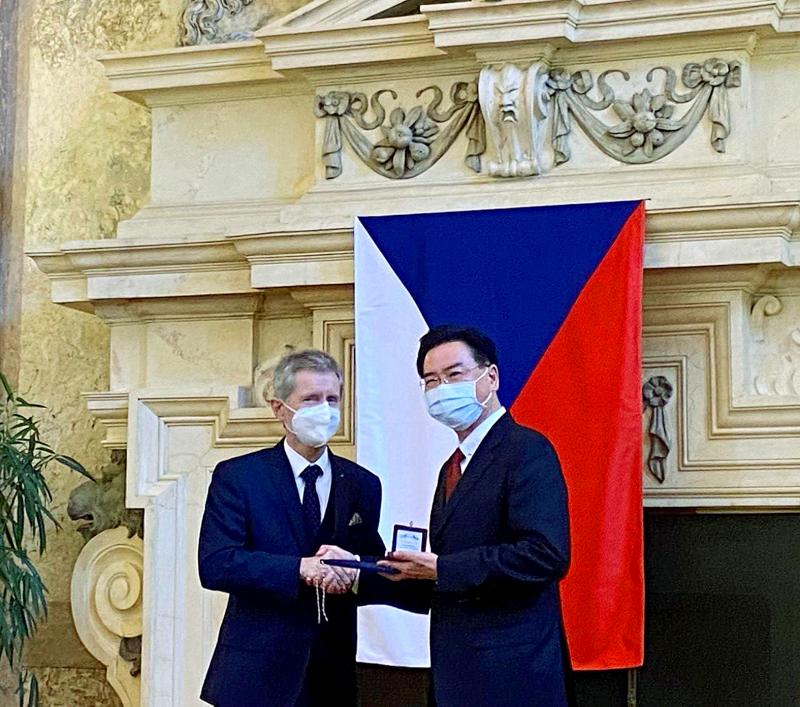Taiwan and the Czech Republic share the determination to defend democracy and freedom, Minister of Foreign Affairs Joseph Wu (吳釗燮) told a forum in Prague yesterday, calling on democratic countries to unite against authoritarianism.
Wu made the remarks at a forum cohosted by the Czech Academy of Sciences and Czech think tank Sinopsis titled “Towards a productive relationship: Engaging with Taiwan in multiple domains.”
“As a former political scientist studying democratization, I have always wanted to visit late [Czech] president Vaclav Havel’s motherland,” Wu is cited as saying in a statement released by the Ministry of Foreign Affairs.

Photo courtesy of the Minister of Foreign Affairs
“The pursuit of freedom and democracy has always been the most important reason that our two countries are closely connected,” he said.
The combination of new technologies and social media has empowered people around the world to voice their views, but at the same time, democracy’s enemies have become increasingly bold and outspoken, Wu said.
“Our democratic accomplishments … need to be underpinned by determination and principles. This is especially true in times when authoritarianism continuously seeks to undermine the values and institutions that we all cherish,” he said.
When democracies are threatened around the world, “we need to work with and support each other. United we stand, divided we fall,” he said.
Taiwan is willing to share its valuable experiences in economic and technological developments with like-minded countries around the world and serve as “a force for good” against authoritarianism, Wu said.
Wu is part of a delegation to Europe that has since Sunday been visiting Slovakia and the Czech Republic.
Wu is invited to a meeting of the Inter-Parliamentary Alliance on China, an international group of lawmakers, in Rome tomorrow, which he might attend via videoconference due to the visit’s tight schedule, the ministry said.
The ministry did not confirm media reports that Wu would also visit Poland and Brussels.
Moreover, a 66-person trade and investment delegation is visiting Lithuania, after leaving the Czech Republic on Tuesday.
Taiwan and Lithuania have agreed to establish representative offices in each other’s capitals, despite pressure from the Chinese government.
Lithuania’s representative office is expected to open at the beginning of next year, Lithuanian Minister of the Economy and Innovation Ausrine Armonaite said.
A Taiwanese firm might open a semiconductor factory in Lithuania, she said.
During a bilateral trade and investment forum yesterday, Taiwan and Lithuania signed six memorandums of understanding in life sciences, information and communications technology, financial technology, electric vehicles, laser technology, semiconductors and food processing.
Additional reporting by CNA

Chinese Nationalist Party (KMT) Chairman Eric Chu (朱立倫), spokeswoman Yang Chih-yu (楊智伃) and Legislator Hsieh Lung-chieh (謝龍介) would be summoned by police for questioning for leading an illegal assembly on Thursday evening last week, Minister of the Interior Liu Shyh-fang (劉世芳) said today. The three KMT officials led an assembly outside the Taipei City Prosecutors’ Office, a restricted area where public assembly is not allowed, protesting the questioning of several KMT staff and searches of KMT headquarters and offices in a recall petition forgery case. Chu, Yang and Hsieh are all suspected of contravening the Assembly and Parade Act (集會遊行法) by holding

PRAISE: Japanese visitor Takashi Kubota said the Taiwanese temple architecture images showcased in the AI Art Gallery were the most impressive displays he saw Taiwan does not have an official pavilion at the World Expo in Osaka, Japan, because of its diplomatic predicament, but the government-backed Tech World pavilion is drawing interest with its unique recreations of works by Taiwanese artists. The pavilion features an artificial intelligence (AI)-based art gallery showcasing works of famous Taiwanese artists from the Japanese colonial period using innovative technologies. Among its main simulated displays are Eastern gouache paintings by Chen Chin (陳進), Lin Yu-shan (林玉山) and Kuo Hsueh-hu (郭雪湖), who were the three young Taiwanese painters selected for the East Asian Painting exhibition in 1927. Gouache is a water-based

Taiwan would welcome the return of Honduras as a diplomatic ally if its next president decides to make such a move, Minister of Foreign Affairs Lin Chia-lung (林佳龍) said yesterday. “Of course, we would welcome Honduras if they want to restore diplomatic ties with Taiwan after their elections,” Lin said at a meeting of the legislature’s Foreign Affairs and National Defense Committee, when asked to comment on statements made by two of the three Honduran presidential candidates during the presidential campaign in the Central American country. Taiwan is paying close attention to the region as a whole in the wake of a

OFF-TARGET: More than 30,000 participants were expected to take part in the Games next month, but only 6,550 foreign and 19,400 Taiwanese athletes have registered Taipei city councilors yesterday blasted the organizers of next month’s World Masters Games over sudden timetable and venue changes, which they said have caused thousands of participants to back out of the international sporting event, among other organizational issues. They also cited visa delays and political interference by China as reasons many foreign athletes are requesting refunds for the event, to be held from May 17 to 30. Jointly organized by the Taipei and New Taipei City governments, the games have been rocked by numerous controversies since preparations began in 2020. Taipei City Councilor Lin Yen-feng (林延鳳) said yesterday that new measures by